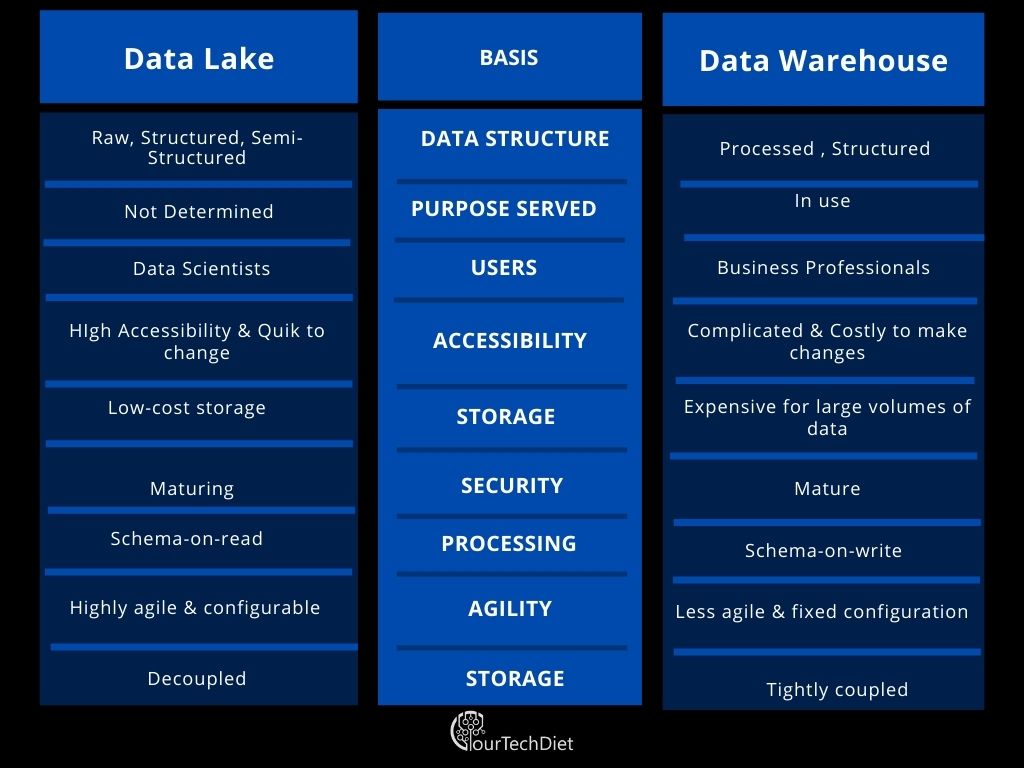Data lake vs Data warehouse is the live blood for any kind of organization. The organization having more accurate data are more likely to gain competitive advantages over others and more likely to succeed.
In recent times, every kind of organization is stressing over storing data in format of their preference Every organization is giving attention to Data analysis for their business purposes and creating their own Data Warehouse.
Which is best among these two is still a debate. But in my view, Data Lake is better than Data Warehouse. Let us discuss the Advantages of using Data Lake over Data Warehouse.
Data Lake Vs Data Warehouse: what’s the difference?
Difference between Data Lake and Data Warehouse
Data Lake and Data warehouse are two interchangeable terms but are not the same.
The key differences between these two are discussed under four heads as followed;
Data Structure: Raw VS Processed
The greatest difference between Data Lakes and Data Warehouse is the different structure of Raw VS Processed data. Data Lakes stores raw or unprocessed data. While, Data warehouse stores processed and filtered data.
The data lakes have a comparatively larger capacity than the data warehouse. In addition the raw and unprocessed data can be analyzed, used for any purpose and can be ideally used for Machine Learning.
To use Data Lakes, appropriate data quality and Data Governance measures should be in place.
Data Warehouse is economic as it stores processed data only.
Users: Data Scientists VS Businesses
As Data lakes store raw data and it is difficult to analyze without familiarity with unprocessed data. This type of data usually requires data scientists or appropriate skills or tools to understand and translate it to specific business use.
While, processed data and filtered data can be used by any businesses and individuals Charts, sheets, tables, and presentations. To use processed and filtered data one just need to be familiar with the presentation of data.
Accessibility: Flexible VS Secured
Accessibility is referred to as ease of Use of data repository. The architecture of Data Lake has no proper structure and so has flexibility of use.
While, the structure of Data Warehouse is such that no foreign particle can invade and very costly to manipulate which makes it very secure.
Unified Data Repository
It is really hard to access data from various locations when required. For example Accessing sales record from Salesforce, your client records on the Database, and your business traffic on Google Analytics.
It becomes very complicated and difficult to analyze when you need all these data together.
In a Data Lake all these data can be kept together so they can be analyzed together. It lays down a basis for data exploration.
Complete query Access
Every business uses transactional data which are posted into a format you can easily query. This is a costly affair in terms of maintaining an API. When it is loaded into a Data Lake you have all the power and flexibility of SQL.
Performance
Accessing data from the actual production database might affect the performance of the application. Query that demands a lot of data does not optimally run on a transactional database.
Data Lakes are used for such ad hoc analytical queries. You can scale up resources on a Data Lake to be able to query data even faster.
Progress
Getting all the data at one spot for progressing to the next step, is only possible when all the data are at a single data warehouse.
In such warehouse you’ll be able to implement proper modeling on the top of your Data Lake. Modeling clear the data, causes few errors and creates less redundancy of work.
Customer Benefiting from Data Lake
The major benefit or advantages of using a Data lake that one can store all kinds of data in one spot at a low cost. In every business one need to analyze data at every single stage of the process to take necessary business decisions.
Gives Better quality of Data:
With the unimaginable power of a Data Lake one can use tools to ensure better quality data.
Economical
Getting every type of data at one place in a Data Lake is economical than using a fragmented or transactional Data Warehouse.
Advanced Analytics
Unlike a Data Warehouse, a Data Lake is capable of utilizing a large quantity of coherent data with Machine Learning and Deep Learning algorithms. It helps in real-time data Analytics.
Single Source
In a Data warehouse data comes from different sources, while in a Data Lake there is an amalgam of structured, unstructured, and raw data in one place.

Conclusion
The table above shows a better comparison between Data Lake and Data warehouse. The advantages of using Data Lake are quite evident from the discussion above.
The Data Lake is better than data warehouse in terms of democratization of data, cost incurred, Analytics, and performance of SQL.
As simple as it may seem now, knowing the difference between these two terms is very crucial in order to deduce some value out of it as well as to make better business decisions and to gain a competitive advantage in the market.
You may also like:

